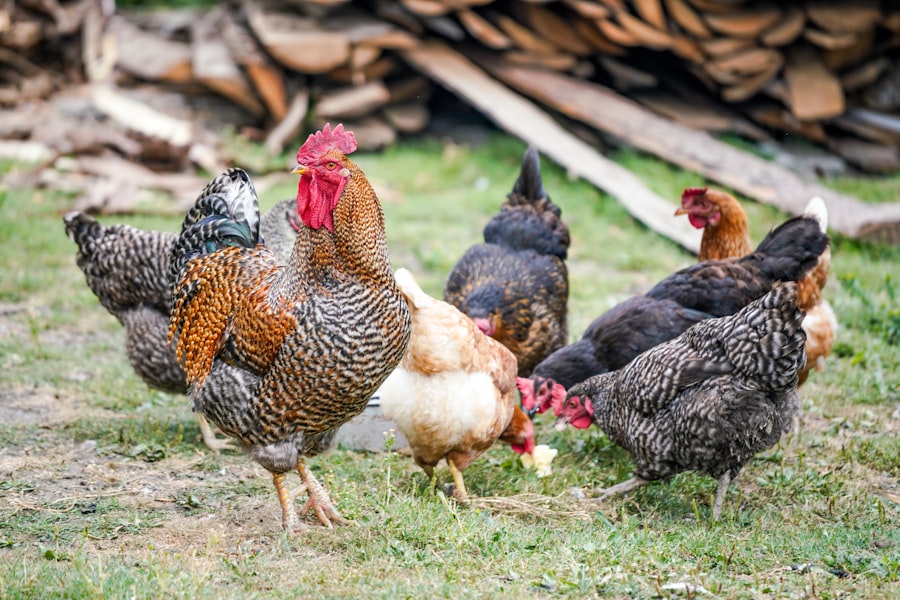Keeping chickens in New York City has become increasingly popular in recent years. Urban residents are drawn to this practice as a way to connect with their food sources and pursue a more sustainable lifestyle. Urban or backyard chicken farming has gained traction across the United States, including New York City.
Many city dwellers are attracted to the idea of raising chickens for fresh eggs and enjoying the companionship of these animals. Keeping chickens can also be an educational and rewarding experience for individuals and families. The trend of urban chicken farming is driven by growing interest in sustainable living and a desire for greater control over food quality and sourcing.
In New York City, where access to fresh, locally sourced food can be limited, keeping chickens provides residents with a direct way to engage with the food system. This practice can also foster community connections as neighbors share knowledge and resources related to urban chicken farming. While there are numerous benefits to keeping chickens in New York City, it is essential for individuals to be aware of relevant laws, regulations, and practical considerations before starting this endeavor.
Understanding these factors is crucial for successful and responsible urban chicken farming in the city.
Table of Contents
- 1 Laws and Regulations Regarding Keeping Chickens in New York City
- 2 Permits and Zoning Requirements for Keeping Chickens in New York City
- 3 Benefits of Keeping Chickens in New York City
- 4 Challenges of Keeping Chickens in New York City
- 5 Resources and Support for Keeping Chickens in New York City
- 6 Is it Legal and Feasible to Keep Chickens in New York City?
- 7 FAQs
- 7.1 What are the regulations for keeping chickens in New York City?
- 7.2 Are there any restrictions on roosters in New York City?
- 7.3 What are the requirements for chicken coops in New York City?
- 7.4 Are there any noise regulations for keeping chickens in New York City?
- 7.5 What are the penalties for not following the regulations for keeping chickens in New York City?
Key Takeaways
- Keeping chickens in New York City is a popular and rewarding hobby for many urban dwellers.
- There are specific laws and regulations in place for keeping chickens in New York City, including restrictions on the number of chickens allowed and coop requirements.
- Permits and zoning requirements are necessary for keeping chickens in New York City, and it’s important to research and adhere to these regulations.
- The benefits of keeping chickens in New York City include access to fresh eggs, natural pest control, and the opportunity for sustainable living in an urban environment.
- Challenges of keeping chickens in New York City include noise, odor, and potential conflicts with neighbors, as well as the time and effort required for proper care and maintenance.
Laws and Regulations Regarding Keeping Chickens in New York City
Department of Health and Mental Hygiene Regulations
In New York City, the Department of Health and Mental Hygiene regulates the keeping of chickens to ensure that it does not pose a threat to public health or safety. As such, there are specific rules regarding the number of chickens that can be kept on a property, as well as guidelines for the construction and maintenance of chicken coops and enclosures.
Disposal of Chicken Waste and Nuisance Prevention
Additionally, there are regulations related to the disposal of chicken waste and the prevention of nuisances such as noise and odors. It is essential for individuals interested in keeping chickens in New York City to familiarize themselves with these regulations and ensure that they are in compliance with all applicable laws.
Building and Homeowners’ Association Restrictions
In addition to city regulations, individuals must also be aware of any restrictions imposed by their building or homeowners’ association, as these entities may have their own rules regarding the keeping of livestock.
Ensuring Legal and Sustainable Urban Chicken Farming
By understanding and adhering to these laws and regulations, individuals can ensure that their urban chicken farming endeavors are legal and sustainable. Failure to do so can result in fines or other penalties, as well as the potential removal of the chickens from the property.
Permits and Zoning Requirements for Keeping Chickens in New York City

In order to keep chickens in New York City, individuals must obtain a permit from the Department of Health and Mental Hygiene. This permit is required for all individuals who wish to keep chickens on their property, regardless of the number of chickens being kept. The permit application process typically involves providing information about the intended chicken coop and enclosure, as well as demonstrating compliance with all relevant regulations.
Once approved, the permit must be prominently displayed on the property where the chickens are being kept. In addition to obtaining a permit, individuals must also ensure that they are in compliance with local zoning requirements. Zoning laws in New York City dictate where certain land uses are permitted, including the keeping of livestock such as chickens.
Individuals must verify that their property is zoned for agricultural or residential uses that allow for the keeping of chickens. If a property is not zoned appropriately, individuals may need to seek a variance or special permit in order to keep chickens legally. By understanding and adhering to these permitting and zoning requirements, individuals can ensure that their urban chicken farming endeavors are in compliance with all applicable laws and regulations.
Benefits of Keeping Chickens in New York City
There are numerous benefits to keeping chickens in New York City, both practical and personal. One of the most obvious benefits is the production of fresh eggs, which can be a valuable food source for individuals and families. Fresh eggs from backyard chickens are often considered to be superior in taste and quality compared to store-bought eggs, making them a desirable commodity for many urban residents.
In addition to eggs, chickens also produce nutrient-rich manure that can be used to fertilize gardens and improve soil quality. This natural fertilizer can help urban gardeners grow healthier plants and produce more bountiful harvests. Beyond the practical benefits, keeping chickens can also provide personal fulfillment and a sense of connection to nature.
Many individuals find joy in caring for their chickens and observing their behaviors, which can be both entertaining and educational. Chickens are known for their social nature and often form close bonds with their human caretakers, providing companionship and amusement. Furthermore, the act of raising chickens can instill a sense of responsibility and stewardship in individuals, as they take on the daily tasks of feeding, watering, and maintaining the health of their flock.
Overall, the benefits of keeping chickens in New York City extend beyond mere practicality and can enrich the lives of those who choose to engage in this rewarding activity.
Challenges of Keeping Chickens in New York City
While there are many benefits to keeping chickens in New York City, there are also significant challenges that individuals must consider before embarking on this endeavor. One of the primary challenges is ensuring that the chickens are properly cared for and protected from potential threats such as predators and disease. Urban environments can present unique risks to chickens, including exposure to pollution, limited space for exercise, and potential conflicts with neighbors or other pets.
Additionally, individuals must be prepared to invest time and resources into maintaining a clean and safe living environment for their chickens, which can be demanding in an urban setting. Another challenge of keeping chickens in New York City is navigating the complex web of laws, regulations, and permitting requirements that govern this activity. Individuals must be diligent in researching and understanding all applicable rules in order to ensure that they are in compliance with the law.
Failure to do so can result in fines or other penalties, as well as potential harm to the welfare of the chickens themselves. Furthermore, individuals must also consider the potential impact of their chicken-keeping activities on their neighbors and community, as conflicts over noise, odors, or other nuisances can arise if proper care is not taken.
Resources and Support for Keeping Chickens in New York City

Local Resources and Support
Local organizations such as community gardens, environmental groups, and agricultural cooperatives often provide educational workshops and networking opportunities for urban chicken farmers. These resources can be invaluable for individuals seeking guidance on best practices for chicken care, coop construction, and legal compliance.
Online Communities and Forums
In addition to local organizations, there are also online communities and forums dedicated to urban chicken farming that can provide a wealth of information and support for individuals. These online platforms allow individuals to connect with other urban chicken farmers from around the world, sharing tips, advice, and stories about their experiences.
Comprehensive Guidance and Resources
Furthermore, there are many books, websites, and publications available that provide comprehensive guidance on all aspects of keeping chickens in an urban environment. By tapping into these resources and support networks, individuals can gain the knowledge and confidence they need to successfully keep chickens in New York City.
Is it Legal and Feasible to Keep Chickens in New York City?
In conclusion, while there are numerous benefits to keeping chickens in New York City, it is important for individuals to carefully consider the legal and practical implications before embarking on this endeavor. By familiarizing themselves with local laws and regulations, obtaining necessary permits, and ensuring compliance with zoning requirements, individuals can ensure that their urban chicken farming activities are legal and sustainable. Additionally, by acknowledging the challenges associated with urban chicken farming and seeking out resources and support networks, individuals can increase their chances of success while minimizing potential conflicts or issues.
Ultimately, whether it is legal and feasible to keep chickens in New York City depends on an individual’s willingness to invest time, effort, and resources into this activity. While there are challenges associated with urban chicken farming, there are also numerous rewards for those who are committed to providing a safe and healthy environment for their flock. By carefully weighing the benefits against the challenges and taking proactive steps to ensure legal compliance and community harmony, individuals can enjoy the many joys of keeping chickens in New York City while contributing to a more sustainable and connected urban environment.
If you’re considering keeping chickens in New York City, you may also be interested in learning about how to care for goslings. This article provides valuable information on the proper care and maintenance of goslings, which can be helpful for urban farmers looking to expand their poultry collection.
FAQs
What are the regulations for keeping chickens in New York City?
In New York City, it is legal to keep chickens in residential areas as long as certain regulations are followed. These regulations include obtaining a permit from the city’s Department of Health and Mental Hygiene, keeping no more than 6 chickens, and ensuring that the coop is at least 15 feet away from any residential building.
Are there any restrictions on roosters in New York City?
Yes, roosters are not allowed to be kept in New York City. Only hens are permitted to be kept for egg-laying purposes.
What are the requirements for chicken coops in New York City?
Chicken coops in New York City must meet certain requirements, including being at least 15 feet away from any residential building, having a minimum of 2 square feet of space per chicken, and being kept clean and odor-free.
Are there any noise regulations for keeping chickens in New York City?
Yes, there are noise regulations in place for keeping chickens in New York City. The crowing of roosters is considered a noise disturbance and is not permitted. It is important to keep noise levels to a minimum to avoid any disturbances to neighbors.
What are the penalties for not following the regulations for keeping chickens in New York City?
Penalties for not following the regulations for keeping chickens in New York City can include fines and the removal of the chickens from the property. It is important to adhere to the regulations to avoid any legal consequences.
Meet Walter, the feathered-friend fanatic of Florida! Nestled in the sunshine state, Walter struts through life with his feathered companions, clucking his way to happiness. With a coop that’s fancier than a five-star hotel, he’s the Don Juan of the chicken world. When he’s not teaching his hens to do the cha-cha, you’ll find him in a heated debate with his prized rooster, Sir Clucks-a-Lot. Walter’s poultry passion is no yolk; he’s the sunny-side-up guy you never knew you needed in your flock of friends!







